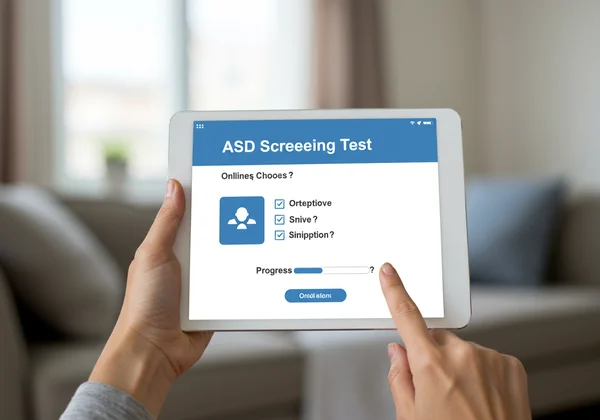Early Signs of ASD in Children: A Parent's Guide to Screening
July 21, 2025 | By Eleanor Sutton
As a parent, you are the world's leading expert on your child. You notice the little quirks, the unique ways they see the world, and their incredible milestones. Sometimes, you may also notice behaviors that make you wonder. If you're observing unique patterns in your child and asking yourself, "What are the first signs of autism?", please know you're not alone. It’s natural to have questions, and seeking answers is a sign of your deep love and commitment. This guide is here to help you understand common developmental differences in toddlers and young children, empower you to observe them effectively, and show how a preliminary online screening tool can be your first insightful step toward understanding and support.
Recognizing Early Signs of Autism Spectrum Traits in Children
Autism Spectrum Disorder (ASD) is a developmental difference that affects how people communicate, interact with others, and experience the world. It’s called a spectrum because it looks different for everyone. For children, some of these traits may become noticeable in early development. Understanding what to look for can help you better interpret your child's unique needs.

Social Communication Differences in Young Children
One of the core areas where ASD traits appear is in social communication and interaction. These are not about being "unfriendly" but about processing social cues differently. You might observe that your child:
- Has difficulty making or maintaining eye contact.
- Does not respond to their name by 12 months of age.
- Rarely points at objects to show interest (e.g., pointing at an airplane flying over).
- Prefers to play alone or struggles to engage in imaginative play with others.
- Has delayed speech or language skills, or loses words they once had.
- Has difficulty understanding other people's feelings or talking about their own.
Repetitive Behaviors and Restricted Interests
A preference for routine and predictability is common among many autistic individuals. This can provide a sense of comfort and safety in a world that can feel overwhelming. These characteristics can manifest as:
- Lining up toys or objects and getting upset when the order is disturbed.
- Repeating words or phrases over and over (echolalia).
- Having a deep, intense interest in specific topics, like trains or dinosaurs.
- Following very specific routines and having difficulty with change or transitions.
- Engaging in repetitive movements, such as hand-flapping, rocking, or spinning. This is often called "stimming" and is a way to self-regulate.
Sensory Sensitivities and Motor Skills
Many autistic children experience the sensory world differently. Senses can be either heightened (hyper-sensitive) or dulled (hypo-sensitive). You might see this as:
- Strong reactions to certain sounds, textures, smells, or lights.
- Seeking out intense sensory input, like spinning or deep pressure hugs.
- Being a "picky eater," often due to the texture or smell of food.
- Unusual coordination, appearing clumsy, or having an odd way of walking.
- Playing with toys in an unusual way, such as focusing on spinning the wheels of a toy car instead of driving it.
When to Observe Further: Developmental Milestones & Red Flags
Every child develops at their own pace, but there are general developmental milestones that can serve as a guide. If you notice your child is consistently not meeting milestones in social, emotional, or communication areas, it’s a valid reason to gather more information. Trusting your gut feeling is important. You know your child best, and your observations are incredibly valuable.
The Importance of Early ASD Screening for Toddlers & Children
Identifying potential developmental differences early doesn't mean labeling a child; it means opening doors to understanding and support sooner. An at-home ASD screening can be a pivotal first move in this journey.

Why Early Identification Makes a Difference
When you understand your child’s unique way of processing the world, you can adapt their environment to better suit their needs. Early insights can help you learn new parenting strategies, find supportive therapies, and advocate for your child in educational settings. This proactive approach can lead to better long-term outcomes, empowering your child to thrive with their unique strengths. If you're considering next steps, an insightful ASD test can provide a structured starting point.
Your Parental Instincts Matter: Trusting Your Observations
Parents often have an instinct when something about their child's development feels different. These feelings are valid and important. An online screening tool can help you organize your observations into a clearer picture, confirming that what you are seeing is worth exploring further. It validates your concerns and transforms them into actionable information, all from the privacy and comfort of your own home.
Using an Online ASD Test for Your Child: Your First Step
Navigating the world of developmental assessments can feel intimidating. A preliminary ASD test online offers a private, low-pressure way to gather initial data and decide on your next steps.
How Our Online Screening Works for Preliminary Insights
Our platform is designed to be a user-friendly, informative first step for parents like you. The process is simple: you answer a series of questions based on your observations of your child's behavior. These questions are inspired by scientifically validated screening principles. The platform then processes your answers to provide a free summary of potential ASD traits. For deeper understanding, there's also an option for a comprehensive AI-Personalized Report, which offers insights into strengths, challenges, and potential action plans. Take the first step towards clarity today.

Interpreting Preliminary ASD Test Results for Parents
Receiving the results of an online screening can bring up a lot of emotions. It's important to remember what these results mean—and what they don't. The score summary provides an indication of whether your child's traits align with those commonly associated with ASD. It's not a label but a data point. Use it as a tool to have more informed conversations with professionals, like your child's pediatrician or a developmental specialist.
Screening vs. Diagnosis: Understanding the Distinction
This is the most critical point to understand: an online screening tool is not a medical diagnosis. This tool provides a preliminary screening to identify potential traits. A formal diagnosis can only be made by a qualified healthcare professional, such as a developmental pediatrician, neurologist, or psychologist, through a comprehensive, in-person evaluation. Our tool is designed to be the bridge that helps you decide if pursuing that formal evaluation is the right next step for your family.
Moving Forward: Understanding and Supporting Your Child
Your journey of discovery starts with a single, courageous step: seeking information. By learning about the early signs of ASD, trusting your parental instincts, and utilizing accessible tools, you are advocating for your child's well-being. An online screening can demystify your concerns and empower you with the clarity needed to support your child in the best way possible.
Ready to gain valuable insights? Start your test now on our homepage. It's a confidential, insightful, and responsible first step toward a richer understanding of your wonderful child.
Section
What are the earliest signs of ASD in a toddler? Some of the earliest signs can include a lack of response to their name, limited eye contact, not pointing at objects to show interest by 14-16 months, and delays in speech development. Repetitive behaviors, like hand-flapping or an intense focus on specific objects, can also be early indicators.
How reliable are online ASD screening tests for children? Online screening tools like ours are designed to be reliable preliminary instruments. They are based on established principles from tools used by professionals (like the M-CHAT-R™). However, they are not diagnostic. Their reliability lies in their ability to indicate if further, formal evaluation is recommended. They are a powerful first step for organizing your observations. A confidential screening test can give you a solid starting point for a conversation with a doctor.
What's the next step after an online ASD screening for my child? After completing an online screening, the best next step is to schedule an appointment with your child's pediatrician or a developmental specialist. Share the summary report from your screening with them. It provides a concrete, organized summary of your concerns and can help facilitate a productive conversation about whether a formal diagnostic evaluation is needed.